We used to love roasted cauliflower, but due to its high FODMAP nature, we have not indulged in years. Thanks to a Q4 Monash University app update, we now know that purple cauliflower has a generous low FODMAP serving of 75 g (about ¾ cup)! Low FODMAP Parmesan Roasted Purple Cauliflower is easy to make, takes advantage of garlic-infused olive oil and a hot oven, for a flavorful, easy, colorful side dish.
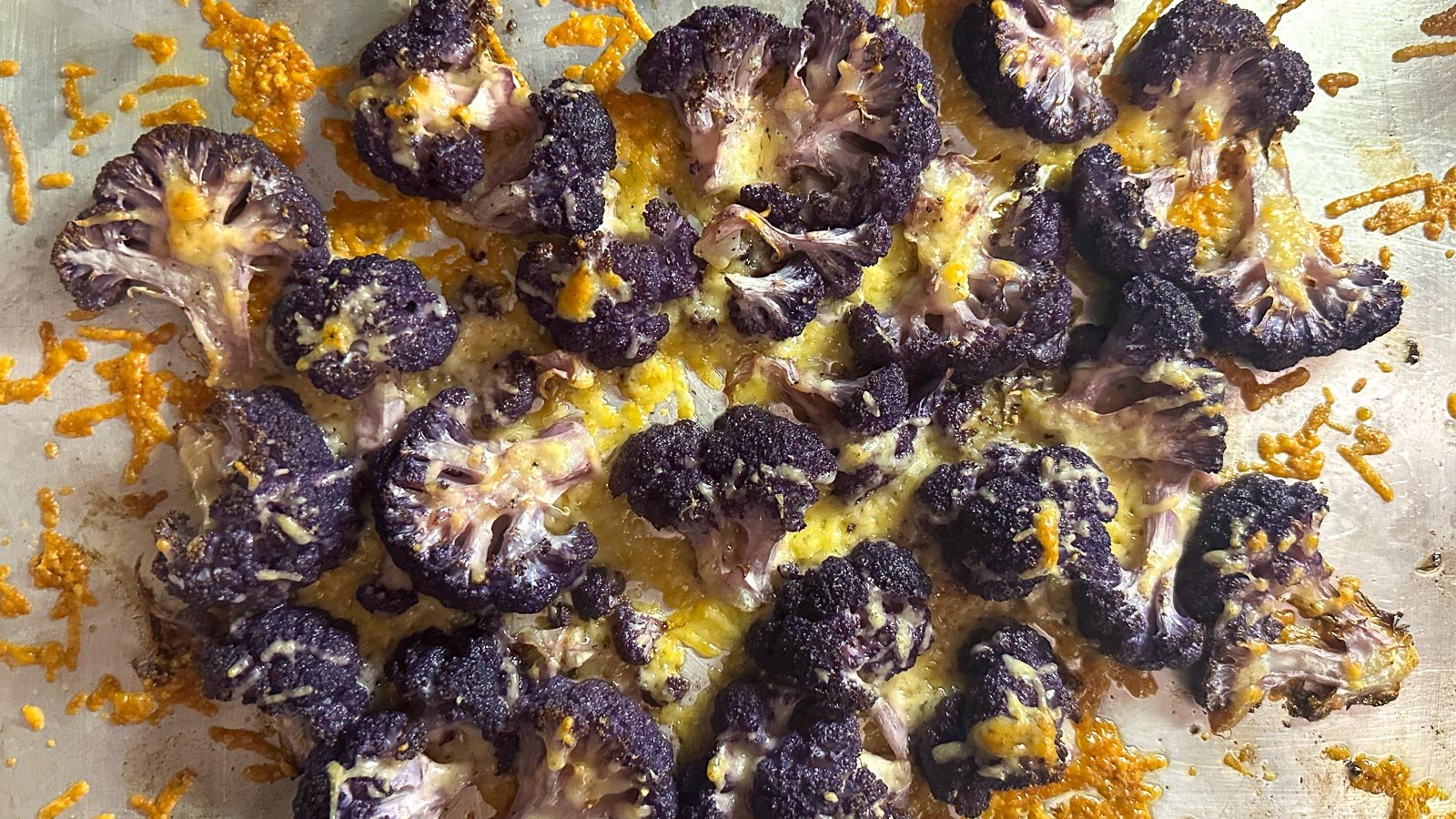
Be sure to check out our Low FODMAP Purple Cauliflower & Chickpea Curry, too.
Is Cauliflower Low FODMAP?
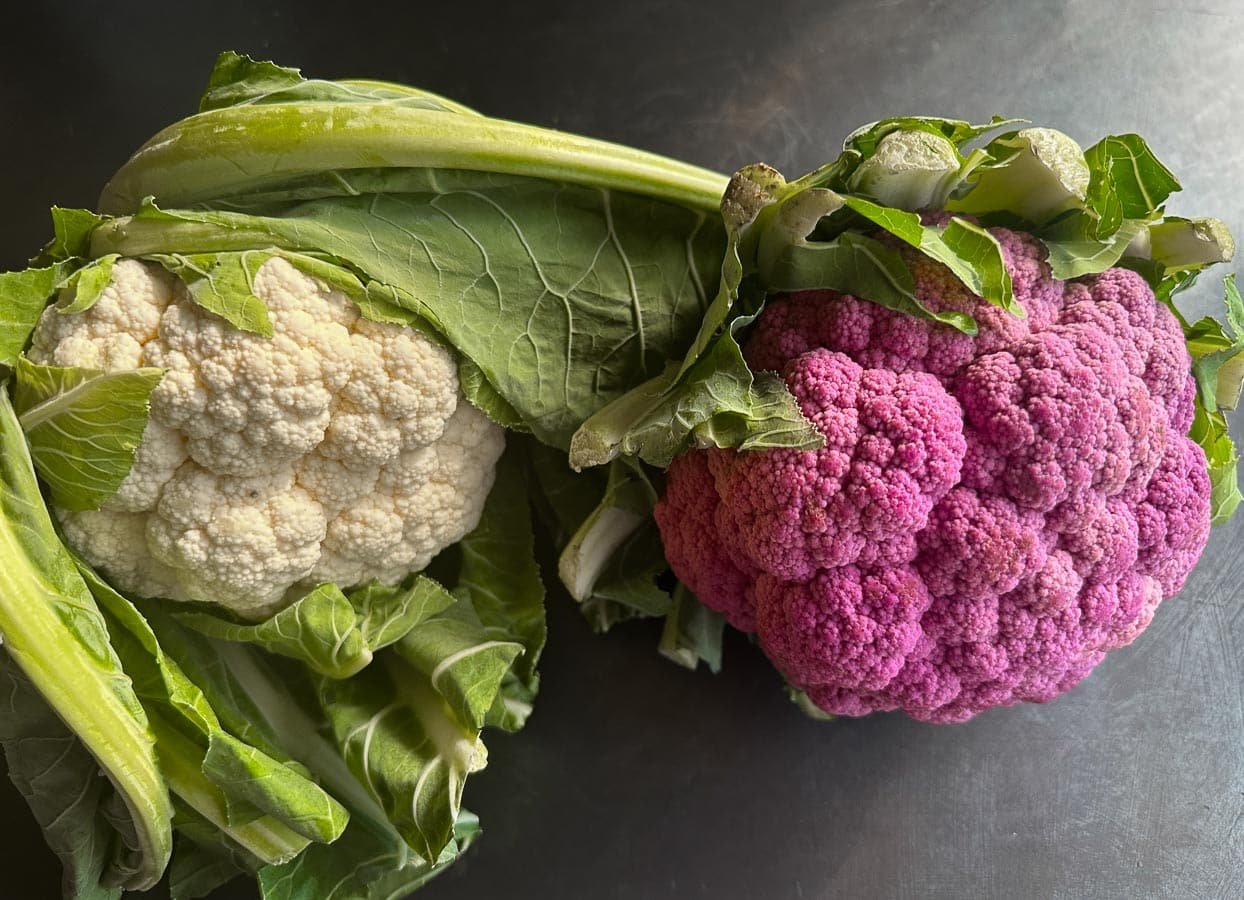
Both white and purple cauliflower have been lab tested, and not only do they not have the same FODMAP levels, but they do also not even contain the same FODMAPs. Please read more in our Explore An Ingredient: Cauliflower.
Making Low FODMAP Parmesan Roasted Purple Cauliflower
The goal is tender cauliflower, retaining a little bit of crisp texture, along with melted cheese, including some crispy parts.
Position rack in upper third of oven. Preheat oven to 425°F (220°C).
Place purple cauliflower florets in mixing bowl with 3 tablespoons of oil, season to taste with salt and pepper, and fold together well to coat.
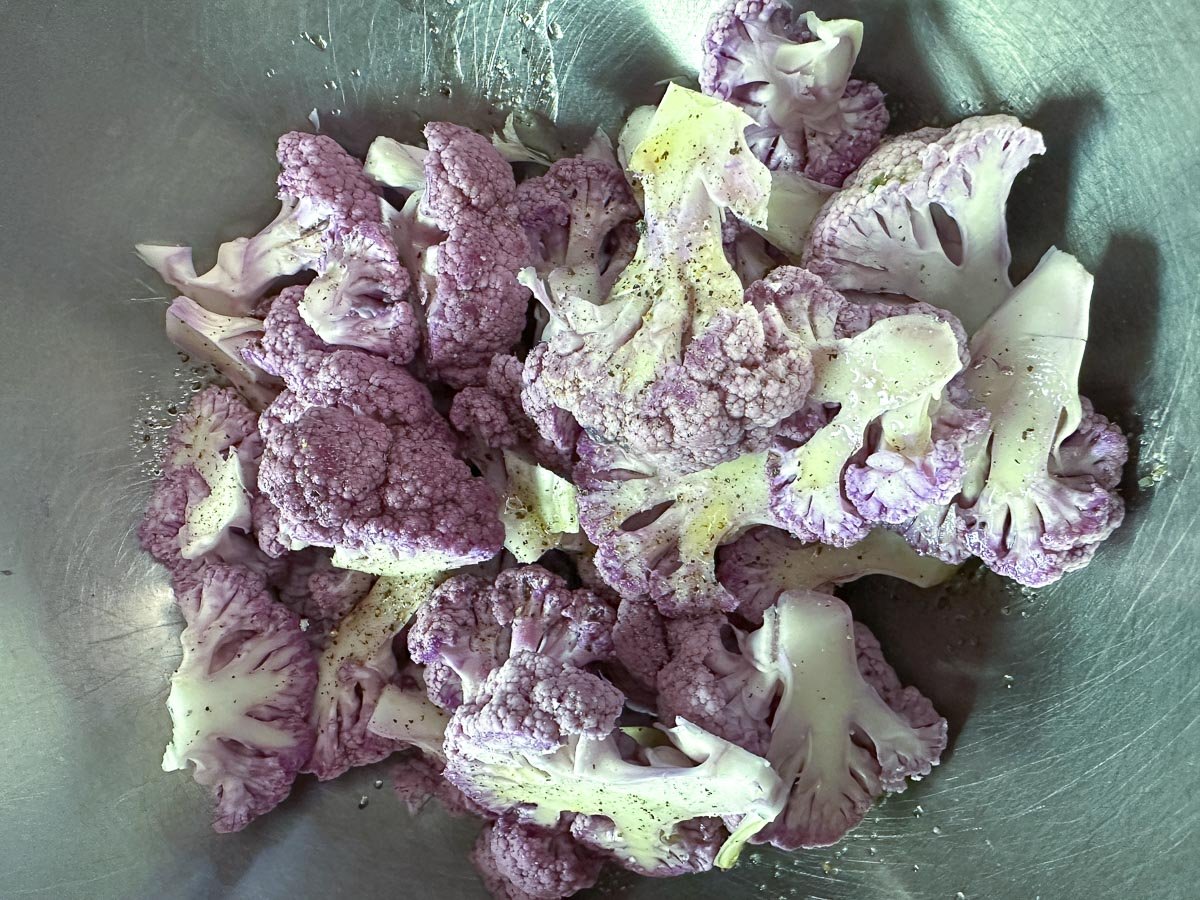
Drizzle remaining 2 teaspoons oil on half-sheet pan and use silicone brush to coat pan evenly with oil.

Dump cauliflower out on pan and use fingers to adjust each piece so that a broad cut side is in contact with the pan.

Roast for 15 minutes; the cauliflower should be crisp/tender. Remove from pan and sprinkle with cheese. This is what shredded Parmesan looks like (not the finely grated).

Sprinkle the cauliflower evenly with the cheese.
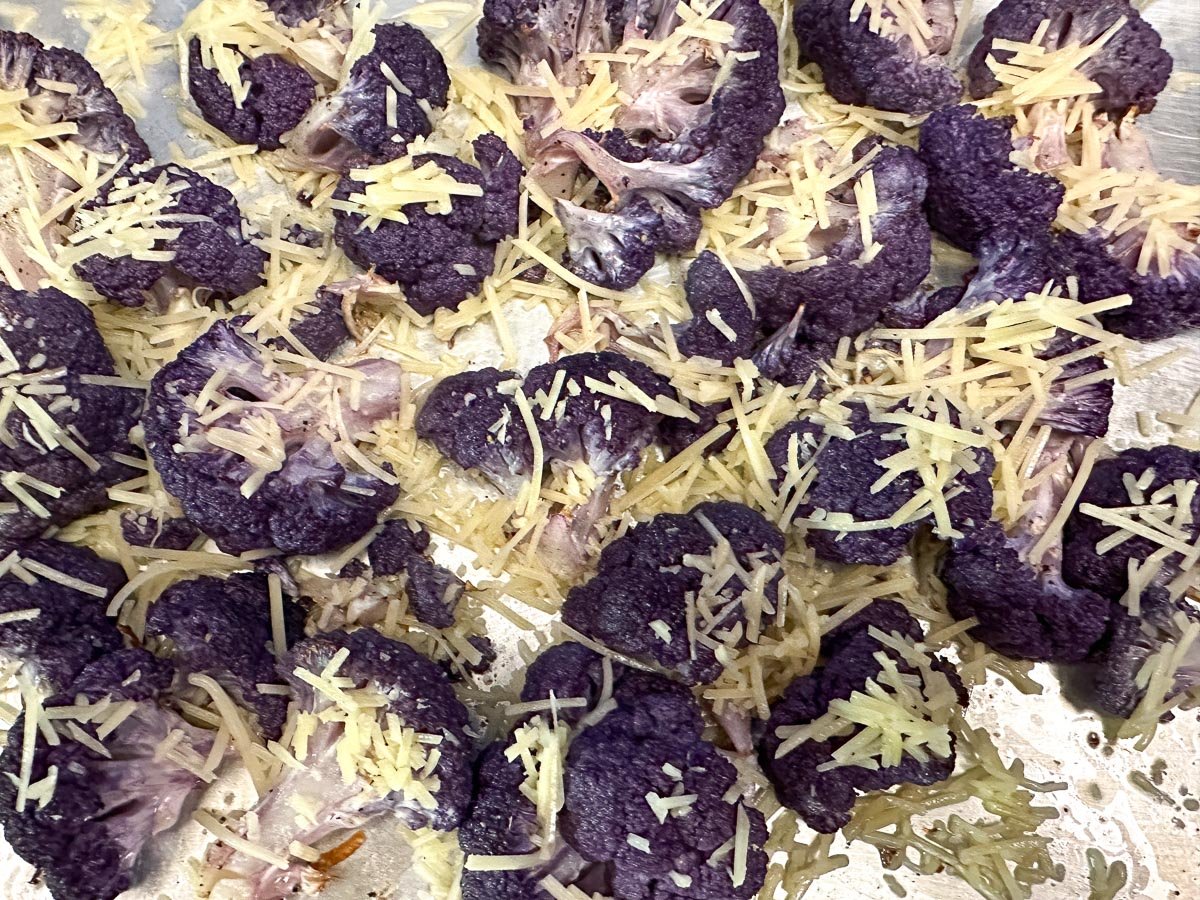
Return to oven for about 5 to 8 more minutes, or until cheese is melted and a bit crispy. Serve immediately.

FODMAP Information
All recipes are based upon Monash University & FODMAP Friendly science at time of initial publication.
- Cauliflower: White cauliflower has been lab tested by Monash University. The amount lab tested – 75 g (about ¾ cup) – is high FODMAP for mannitol. Unfortunately, they have not lab tested smaller amounts. Purple cauliflower has recently (Q4 2024) been lab tested by Monash and quite surprisingly it has a low FODMAP serving size of 75 g (about ¾ cup) and doesn’t become Moderate until 112 g, and the FODMAP is fructose, not mannitol. Even at the High FODMAP amount of 150 g, no mannitol appears. FODMAP Friendly has lab tested white cauliflower and the amount their testing shows is low FODMAP is a mere 9 g. Mannitol is the FODMAP shown. They have not tested purple.
- Cheese: Many cheeses have low FODMAP serving sizes. The low FODMAP diet is not a dairy-free diet. Hard cheeses such as Parmigiano Reggiano or Pecorino Romano have been lab tested by Monash University and are low FODMAP in 40 g amounts – and the servings remain low FODMAP up to 500 g.
- Dairy: The low FODMAP diet is not a dairy-free diet. It is however, low in lactose. Many dairy ingredients are low in lactose, such as heavy cream and many cheeses.
- Garlic-Infused Oil: Make your own Garlic-Infused Oil or buy a commercial equivalent for the easiest way to add garlic flavor to your food. Fructans in garlic are not oil-soluble, so garlic-infused oil is low FODMAP.
Please always refer to the Monash University & FODMAP Friendly smartphone apps for the most up-to-date lab tested information. Foods will be retested from time to time; in the case of raw ingredients, such as fruits and vegetables, results may vary. All lab tested results are valid and represent a snapshot in time. As always, your tolerance is what counts; please eat accordingly. The ultimate goal of the low FODMAP diet is to eat as broadly as possible, without triggering symptoms, for the healthiest microbiome.

Low FODMAP Parmesan Roasted Cauliflower
We used to love roasted cauliflower, but due to its high FODMAP nature, we have not indulged in years. Thanks to a Q4 Monash University app update, we now know that purple cauliflower has a generous low FODMAP serving of 75 g (about ¾ cup)! Low FODMAP Parmesan Roasted Cauliflower is easy to make, takes advantage of garlic-infused olive oil and a hot oven, for a flavorful, easy, colorful side dish.
Ingredients:
- 1- pound (455 g) purple cauliflower florets
- 3 tablespoons plus 2 teaspoons Low FODMAP Garlic-Infused Oil, made with olive oil, purchased or homemade
- Kosher salt
- Freshly ground black pepper
- 2- ounces (55 g) shredded Parmesan cheese
Preparation:
-
Position rack in upper third of oven. Preheat oven to 425°F (220°C).
-
Place purple cauliflower florets in mixing bowl with 3 tablespoons of oil, season to taste with salt and pepper, and fold together well to coat.
-
Drizzle remaining 2 teaspoons oil on half-sheet pan and use silicone brush to coat pan evenly with oil.
-
Dump cauliflower out on pan and use fingers to adjust each piece so that a broad cut side is in contact with the pan.
-
Roast for 15 minutes; the cauliflower should be crisp/tender. Remove from pan and sprinkle with cheese. Return to oven for about 5 to 8 more minutes, or until cheese is melted and a bit crispy. Serve immediately.
Notes:
FODMAP Information
All recipes are based upon Monash University & FODMAP Friendly science at time of initial publication.
• Cauliflower: White cauliflower has been lab tested by Monash University. The amount lab tested – 75 g (about ¾ cup) – is high FODMAP for mannitol. Unfortunately, they have not lab tested smaller amounts. Purple cauliflower has recently (Q4 2024) been lab tested by Monash and quite surprisingly it has a low FODMAP serving size of 75 g (about ¾ cup) and doesn’t become Moderate until 112 g, and the FODMAP is fructose, not mannitol. Even at the High FODMAP amount of 150 g, no mannitol appears. FODMAP Friendly has lab tested white cauliflower and the amount their testing shows is low FODMAP is a mere 9 g. Mannitol is the FODMAP shown. They have not tested purple.
• Cheese: Many cheeses have low FODMAP serving sizes. The low FODMAP diet is not a dairy-free diet. Hard cheeses such as Parmigiano Reggiano or Pecorino Romano have been lab tested by Monash University and are low FODMAP in 40 g amounts – and the servings remain low FODMAP up to 500 g.
• Dairy: The low FODMAP diet is not a dairy-free diet. It is however, low in lactose. Many dairy ingredients are low in lactose, such as heavy cream and many cheeses.
• Garlic-Infused Oil: Make your own Garlic-Infused Oil or buy a commercial equivalent for the easiest way to add garlic flavor to your food. Fructans in garlic are not oil-soluble, so garlic-infused oil is low FODMAP.
Please always refer to the Monash University & FODMAP Friendly smartphone apps for the most up-to-date lab tested information. Foods will be retested from time to time; in the case of raw ingredients, such as fruits and vegetables, results may vary. All lab tested results are valid and represent a snapshot in time. As always, your tolerance is what counts; please eat accordingly. The ultimate goal of the low FODMAP diet is to eat as broadly as possible, without triggering symptoms, for the healthiest microbiome.
Nutrition
All nutritional information is based on third-party calculations and should be considered estimates. Actual nutritional content will vary with brands used, measuring methods, portion sizes and more. For a more detailed explanation, please read our article Understanding The Nutrition Panel Within Our Recipes.
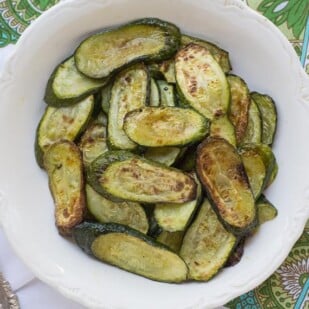
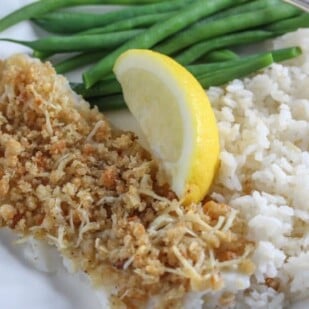



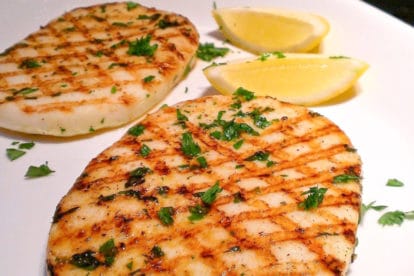

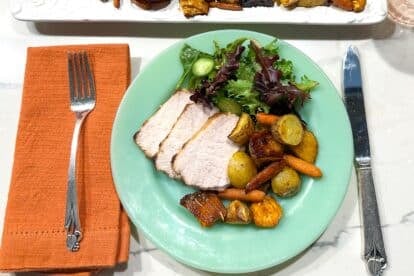
You CAN have purple cauliflower even during Elimination!